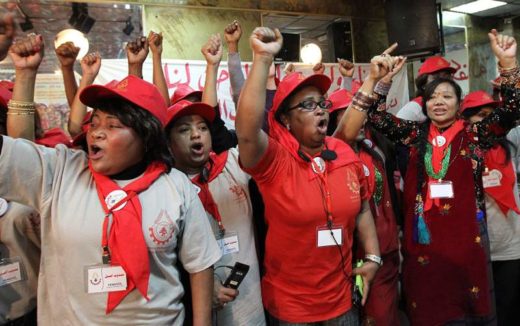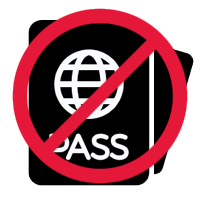Lebanon is home to over 250,000 migrant domestic workers (MDWs), who come from African and Asian countries and work in private households. The vast majority of these workers are women. Migrant domestic workers in Lebanon are trapped in a web woven by the kafala system, an inherently abusive migration sponsorship system, which increases their risk of suffering labour exploitation, forced labour and trafficking and leaves them with little prospect of obtaining redress.
All migrant domestic workers are excluded from the Lebanese Labour Law and are governed instead by the kafala system, which ties the legal residency of the worker to the contractual relationship with the employer. If this employment relationship ends, even in cases of abuse, the worker loses regular migration status. Moreover, the worker cannot change their employer without the latter’s permission. This allows the employer to coerce the worker to accept exploitative working conditions. If a migrant domestic worker refuses such conditions and decides to leave the home of the employer without the latter’s consent, the worker risks losing their residency status and consequently detention and deportation.
Amnesty International’s new report entitled “Their Home Is My Prison” demonstrates significant consistencies in the types of abuses towards MDWs. These include extreme working hours and lack of rest days, severe restrictions on freedom of movement and communication, food deprivation and lack of proper accommodation, verbal and psychological abuse, and physical violence. In addition, Amnesty International documented cases of abuse by recruitment agencies, forced labour and human trafficking.
In February and March 2019, Lebanon’s new Minister of Labour said that he would prioritize modernizing the Labour Law and work to improve the conditions of domestic workers. The statements of intent are welcome but need to be expanded and translated into substantive legislative and policy measures to ensure that the rights of migrant domestic workers are fully respected.
Amnesty International calls on the Lebanese authorities to end the kafala system and extend labour protections to migrant domestic workers.
I started having suicidal thoughts because of being locked up all the time.
Sebastian, domestic worker from Côte d’Ivoire
End Kafala: Justice for Migrant Domestic Workers in Lebanon
Share this video on social media and demand that Lebanon extend labour protections to migrant domestic workers.

UNRECOGNIZED AND UNPROTECTED BY THE LEBANESE LABOUR LAW
The Lebanese Labour Law explicitly excludes domestic workers, denying both Lebanese and migrant domestic workers labour protections enjoyed by other workers such as a minimum wage, overtime pay, compensation for unfair dismissal, social security and parental leave. This exclusion of domestic workers from fundamental labour protections is contrary to Article 7 of the International Covenant on Economic, Social and Cultural Rights, to which Lebanon has acceded. The article guarantees that all workers should enjoy just and favourable conditions of work without discrimination.
Moreover, the Labour Law denies “foreigners” the right to elect or be elected as union representatives. On 29 December 2014, six Lebanese workers submitted a request to the Ministry of Labour to form a union for domestic workers; a month later, around 350 domestic workers of various nationalities gathered for the union’s inaugural congress. However, the Ministry of Labour refused to recognize the union. This restriction on the right of migrant domestic workers to freedom of association and collective bargaining is in violation of the country’s obligations under Article 22 of the International Covenant on Civil and Political Rights, which stipulates that “everyone shall have the right to freedom of association with others, including the right to form and join trade unions for the protection of his interests.”
In December 2018, Amnesty International met with migrant domestic worker activist Sujana Rana in Nepal, two years after her deportation from Lebanon for her union activism for the rights of migrant domestic workers. Watch the video here.
The main legal document that outlines the rights and obligations of domestic workers and their employers is the unified standard contract, introduced by the Ministry of Labour in 2009. The contract prevents the employer from forcing the worker to work outside the home; restricts the maximum number of working hours to 10 a day, with at least eight continuous hours of rest at night; entitles the worker to a 24-hour weekly rest period, paid sick leave and six days of annual leave; requires the employer to pay the full salary at the end of each month with receipts of payment signed by both parties, to purchase health insurance for the worker and to allow her to receive calls and to cover the cost of one phone call to her parents per month. Despite setting out these basic rights, the unified standard contract has numerous shortcomings that leave workers at risk of exploitation and other abuse. Read more about the needs to reform the contract as well as the restrictive immigration policies in the full report.
Exploitative Working Conditions









Amnesty International’s research on migrant domestic workers indicates the extent to which they continue to be subjected to exploitation and other abuse. The interviews it has conducted with 32 workers in 2018 and 2019 reveal alarming patterns of abuse.
Although the unified standard contract restricts the maximum number of working hours to 10 a day and requires at least eight continuous hours of rest at night, the majority of the women interviewed by Amnesty International, 19 of the 32, said they were forced to work more than 10 hours a day and were allowed less than eight continuous hours of rest. Moreover, 14 of them said they were denied their weekly day off.
Nine women told Amnesty International that they had to work in more than one household or were asked to carry out non-domestic work outside the home. Mollimaret, an Ethiopian domestic worker, told Amnesty International that she worked in her employer’s home during the day and in his bakery at night: “I worked in the house during the day, and at night I prepared the pastry fillings for their bakery. I had no sleep. After seven months of working for them, I got sick because of the workload.”
The standard unified contract requires the employer to pay the full salary at the end of each month, with a receipt of payment to be signed by both parties. However, seven of the domestic workers interviewed by Amnesty International reported that they were not paid at the end of each month.
I did not get paid the first three months. When I asked my employer about my salary, she said, ‘What if you run away?’
Bizu, domestic worker from Ethiopia
Lebanese law does not explicitly prohibit withholding a worker’s passport nor does the unified standard contract address this issue. Twenty of the women interviewed by Amnesty International reported that General Security had given their passports directly to their employers upon their arrival in Lebanon.
A number of interviewees relayed experiences of coerced isolation in which employers prevented them from leaving the home in which they worked or communicating freely with friends and relatives.
Restrictions on movement and communication, besides being inherently discriminatory and in violation of both Lebanese and international law, prevent employees from reporting abuse and from seeking help.
Call on Lebanon to protect migrant domestic workers
Take Action!
Many of the domestic workers interviewed by Amnesty International shared accounts of being deprived of adequate food. Bizu, for instance, said she was not allowed to open the refrigerator or prepare her own food; instead her employer would hand her the food that she was allowed to eat. For her, it was not enough: “Sometimes I would get so hungry,” she said. “I used to mix water with sugar when I was hungry and drink it.”
Most domestic workers interviewed by Amnesty International said they slept in the living room, in the kitchen, in a storage room or on the balcony. Those women reported that the lack of privacy made them feel exposed and unprotected.
The majority of women interviewed reported being subject at least once to humiliating and dehumanizing treatment by their employers. Common verbal abuse included calling the worker derogatory names such as “donkey”, “bitch” and “animal.”
The isolation of migrant domestic workers, their dependence on their employer and their lack of protection under Lebanese law place them at risk of physical and sexual violence. Six of the 32 women Amnesty International interviewed said they were subjected to physical abuse such as their employer slapping, beating or choking them, pulling their hair and hitting their head against the wall. Underlining the power imbalance between employers and migrant domestic workers, many said they were particularly subjected to such abuse when they tried to challenge their employers.
Although the unified standard contract requires the employer to ensure health insurance coverage for the domestic worker, most women interviewed reported that their employers had, on occasions, not facilitated medical care for them.
Exploitation and other abuse can have a devasting impact on the mental health of any individual. In the case of domestic workers, especially live-in workers, poor living and working conditions, isolation, threats and intimidation, violence and other abuse are all factors that lead to emotional distress. Amnesty International interviewed six women who had either experienced suicidal thoughts or attempted suicide.
I told Madame, ‘I am sick, I want to go to the doctor.’ She said, ‘Take Panadol’.
Nethmi, domestic worker from Sri Lanka
READ THE FULL REPORT
All hours are working hours.
Tsega, Ethiopian domestic worker in Lebanon
Forced labour and human trafficking
Labour exploitation is a spectrum of abuse that includes forced labour, one of its most serious forms. The two main elements of forced labour are the threat of penalty and the lack of consent to work.
If a migrant domestic worker cannot leave her job and is compelled to work because she fears the consequences of quitting, then she is subject to forced labour. There are several indicators that help identify persons who are trapped in a situation of forced labour. They include the “abuse of vulnerability”, deception, restriction of movement, isolation, physical and sexual violence, intimidation and threats, retention of identity documents, withholding of wages, debt bondage, abusive working and living conditions, and excessive overtime. In its new report, Amnesty International documented several cases of women who reported being subjected to more than one of these indicators at the same time. Some women who were in situations of abuse wanted to leave and asked their employers to return them to the recruitment agencies or to their home countries, but their employers turned down these requests. These women stayed on against their will, because, had they attempted to leave without their employers’ consent, they would have lost their legal status in Lebanon and therefore risked detention and deportation.
“Mila”, a 48-year-old domestic worker from the Philippines, told Amnesty International that she was dissatisfied with her working conditions. Her employer overworked her, deducted money from her salary and denied her a day off. When she complained and asked to leave, her employer locked her up for three days in a room.
The kafala system means that a migrant domestic worker cannot simply resign if her working conditions are abusive. She would need the consent of her employer, who happens to be her abuser in these cases. These cases illustrate how the kafala system can facilitate forced labour.
When I asked her to send me back to my country, she [employer] said, ‘You have to work for the US$3,000 we paid.’
Sebastian, domestic worker from Côte d’Ivoire
In the most serious cases of labour exploitation of migrant domestic workers, human trafficking may also arise. Under the Protocol to Prevent, Suppress and Punish Trafficking in Persons, Especially Women and Children, which has been ratified by Lebanon, human trafficking consists of three constituent elements: an act (the recruitment, transportation, transfer, harbouring or receipt of persons); a means (threat or use of force or other forms of coercion, abduction, fraud, deception, abuse of power or of a position of vulnerability, or the giving or receiving of payments or benefits); and a purpose (exploitation, including sexual exploitation, forced labour or services, slavery or practices similar to slavery, servitude or the removal of organs).
If a migrant domestic worker is recruited (the act) by use of deception (the means) to subject her to labour exploitation, including forced labour (the purpose), then she is a victim of human trafficking.
Amnesty International interviewed two women who reported being deceived by recruiters about the terms and conditions of work. They said that, once they arrived in Lebanon, they were unable to leave because their employers confined them to the home and withheld their passports. Read more testimonies from migrant women in the full report.
BARRIERS TO JUSTICE
None of the women interviewed for the report had reported their employers to the authorities or tried to take them to court. While the reasons varied from one case to another, they included fear of arrest, fear of being unable to obtain new employment and fear of being falsely accused of theft and are generally representative of the barriers facing migrant domestic workers’ access to justice in Lebanon.
I didn’t report to the police. They scare me. I was afraid they’d put me in jail.
“Eva”, domestic worker from the Philippines
Under the kafala system, migrant domestic workers’ access to justice is compromised. This is in violation of Lebanon’s obligations under Article 2(3)(a) of the International Covenant on Civil and Political Rights, which states that everyone whose rights and freedoms under the covenant are violated shall have an effective remedy, as well as of Article 2(1) of the International Covenant on Economic, Social and Cultural Rights.
#ENDKAFALA
Amnesty International calls on the Lebanese authorities to end the kafala system and extend labour protections to migrant domestic workers. Join our call and share this page!

